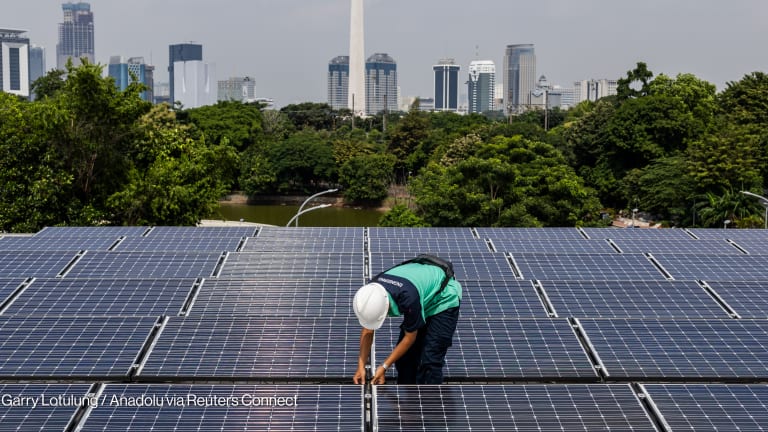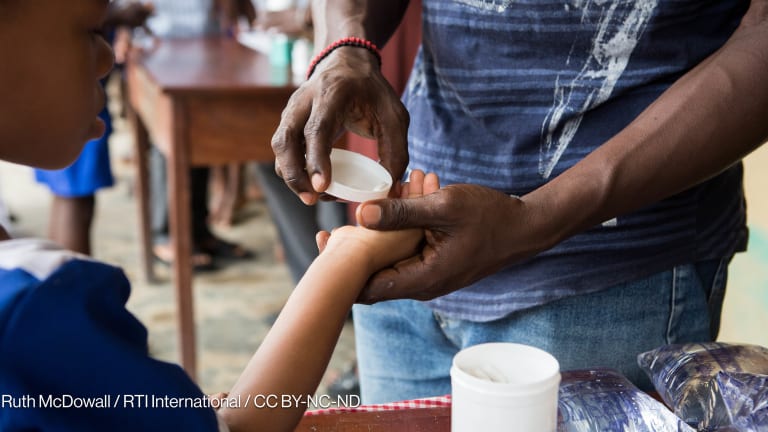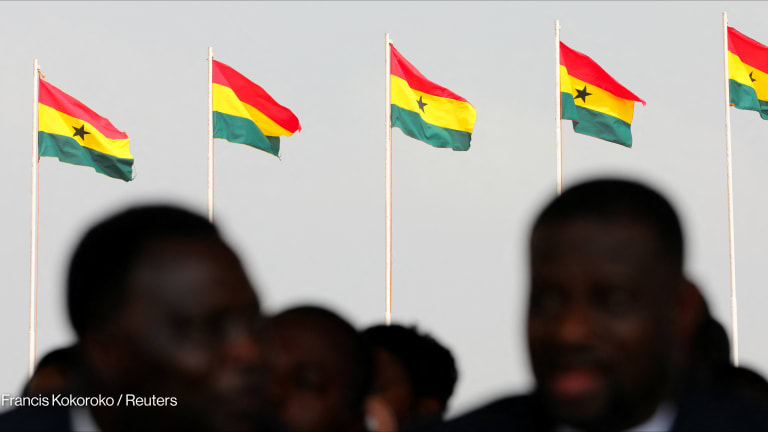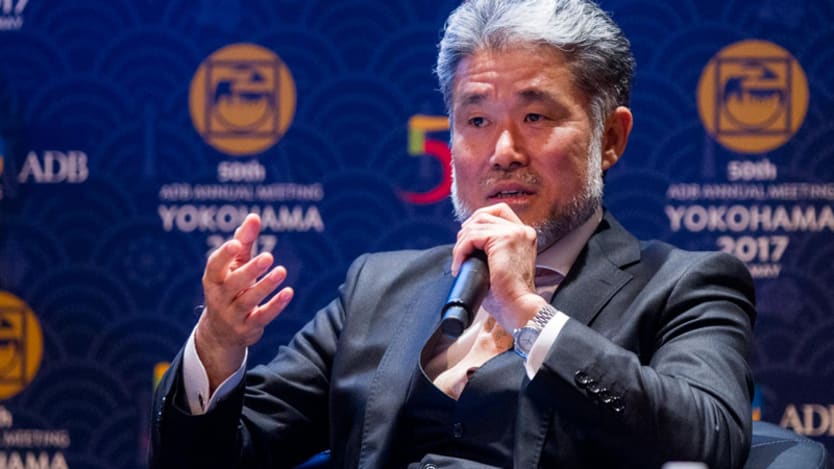
Japan’s foreign assistance has often been associated with infrastructure projects. But over the past five years, the bilateral donor has become a vocal proponent in the push for universal health coverage.
Health has been an important priority for Japanese aid from the get-go, said Takao Toda, vice president for human security and global health at the Japan International Cooperation Agency. Still, the emphasis has often been on infrastructure, as opposed to looking at the broader dimensions of a country’s health systems, which is integral to the achievement of UHC.
What's next for Japanese aid in UHC push
Japan is one of the big proponents of universal health coverage. But what does that mean in terms of its development assistance? Devex spoke with Ikuo Takizawa, deputy director general of the human development department at the Japan International Cooperation Agency.
A review of JICA’s grant assistance for health a decade ago in 2007, for example, was composed of hospital and medical equipment improvements. In addition, a lot of its work focused on health is done in isolation. For instance, JICA had projects focused on maternal and child health in Bogotá, Colombia, and Asunción, Paraguay, and yet there was almost no attempt to connect or learn from each project to avoid or prevent the repetition of failures, Toda said.
That has been changing. Japan’s bilateral aid agency has been working to strategize its activities toward UHC, Toda told Devex. This includes facilitating dialogue between countries to share knowledge on what works, what doesn’t and what can be done more efficiently.
“From a global perspective, we have very, very big room for potential for Japan to be more proactive in global health, needless to explain what’s going on in [the] United States and Europe,” he said,
An overview of JICA’s current health aid still contains infrastructure-focused grants, such as the construction of a teaching hospital in Mongolia and the improvement of medical equipment in Myanmar’s hospitals in Yangon and Mandalay. But also apparent are projects focused on improving the quality of health services, strengthening health systems and building the capacity of institutions and health workers, including specialists in infectious diseases.
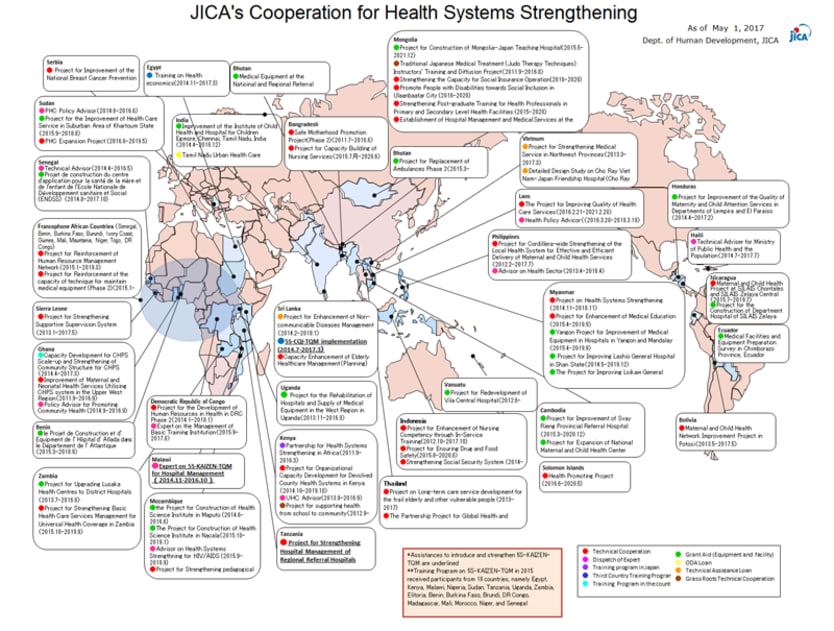
JICA also puts emphasis on individuals’ health throughout the life course. It has developed a handbook for maternal and child health, and working with countries in promoting a system for long-term care for the aged. In Thailand, where the elderly number over 6 million, the agency has been helping provide policy recommendations on their long-term care, developing service models and training programs for care workers and coordinators.
“People are treating elderly people in a too much compartmentalized manner. Doctors are seeing diseases. The labor ministry is seeing just employment, [while] the welfare ministry is seeing just pension. Nobody cares about elderly people in a holistic way, as a human being,” Toda said.
In addition, he said elderly people still contributes to society, and therefore should be seen as a “bonus” to the population, instead of an “onus.”
“We talk about elderly people [as a] problem, to be protected, to be spent lots of money on … but that’s wrong,” the senior JICA official said.
Loans for health
Most of JICA’s work on UHC is funded through grants and technical cooperation, but the bilateral donor is also hoping to make more use of its concessional loans, which in 2015 amounted to 2.26 trillion Japanese yen ($19.9 billion) for both ODA loans and private sector investment finance commitments.
“It’s very easy to calculate the financial rate of return when you construct some road, port or power plant. But when it comes to capacity development of health workers, how can we demonstrate?”
— Takao Toda, vice president for human security and global health at JICATo some extent it has been able to. For example, in 2015, it signed an agreement with the government of Kenya for a health sector policy loan amounting to 4 billion Japanese yen ($35.2 million). That amount is repayable in 40 years, with a grace period of 10 years. The project’s interest rate is at less than 1 percent.
The bilateral donor also signed an 8.4 billion Japanese yen ($73.9 million) UHC loan agreement with Senegal in 2016, with almost the same terms, except the package has a lower annual interest rate of 0.01 percent.
But Toda said the aid agency still has a “long, long way to go” in tapping concessional loans for health.
Most countries’ appetite for money is targeted toward economic infrastructure, as this is seen to have huge contributions on a country’s growth potential. In addition, it’s also relatively easy to calculate the rate of return on them.
“It’s very easy to calculate the financial rate of return when you construct some road, port or power plant. But when it comes to capacity development of health workers, how can we demonstrate? It was a bit of a challenge,” he said.
Based on the donor’s experience, a couple of “preconditions” are also required to encourage countries to borrow for health.
“The first one needs evidence of a small success story through our technical cooperation,” Toda said. “The second one is trust through the creation of these success stories.”
Health in the current geopolitical context
Japan’s push for UHC comes at a critical juncture for emerging economies, such as in Asia. The best time for countries to prioritize health coverage for all of its population is before it becomes richer or achieves high-income status, not after, Toda suggested.
Countries would say “we are still poor so we are not able to do what Japan does. But that is wrong. In 1961, we were poor, but we covered all people,” he said, speaking of Japan’s national health insurance system.
The senior JICA official understands the current geopolitical situation could have an impact on countries’ efforts, but that is why the donor is using both diplomacy and convening power to encourage countries such as the U.S. — the biggest single resource of development finance for health — to maintain their commitment to the global health agenda. JICA is also engaging other stakeholders to support the UHC cause. Already twice this year, a high-level Japanese delegation engaged policy experts and senior U.S. officials in a dialogue, emphasizing the importance of continued U.S. leadership and cooperation on global health.
At ADB’s annual meeting in Yokohama, Japan, in May, JICA and the bank agreed to explore opportunities for joint technical assistance, co-financing and knowledge exchange to promote health security and UHC in the Asia Pacific region. Japan is also planning another high-level meeting on UHC in December.
“We could mutually encourage each other to go for more — spend more money, spend more energy on the health sector — so that we can cushion the blow,” Toda said.
Read more international development news online, and subscribe to The Development Newswire to receive the latest from the world’s leading donors and decision-makers — emailed to you free every business day.





